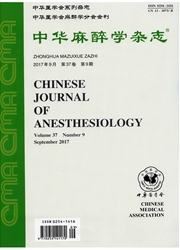

 中文摘要:
中文摘要:
目的研究短时间外部高温和低温环境刺激对小鼠空间记忆、体重及运动的影响。方法C57BL/6雄性小鼠24只,2~3月龄,体重21—24g,将小鼠按照随机数字表法分为3组(每组8只):对照组、高温组和低温组。3组小鼠在20℃常规饲养环境温度下适应3周后,将高温组小鼠置于38℃高温环境,低温组小鼠置于4℃低温环境,对照组置于20℃的室温环境中,环境温度刺激持续6h。采用小鼠智能鼠笼自动监测小鼠空间记忆和运动,每日记录各组小鼠体重水平变化。结果与对照组比较,高温组小鼠在处理后第3-6天出现明显的空间记忆提高[第3天(82±7)%比(74±8)%,第4天(87±12)%比(71±4)%,第5天(80±9)%比(6±+6)%,第6天(84±6)%比(73±7)%](P〈0.05),且其体重水平持续降至处理后第8天[第5天(27.5±1.2)g比(29.1±0.7)g,第6天(28.6±1.0)g比(30.1±0.7)g,第7天(28.7±1.0)g比(30.4±0.8)g.第8天(29.9±0.5)g比(30.6±0.5)g](P〈0.05)。高温及低温处理后第2-4天均表现出明显的鼻触时间减少[第2天(361±74)s比(576±88)s,第3天(487±104)S比(631±81)S,第4天(532±88)S比(678±35)S](P〈0.05)。低温组未见明显空间记忆及体重水平改变;在处理后3~4d表现为鼻触时间减少[第3天(501±103)S比(631±81)s,第4天(492±74)S比(678±35)s](P〈0.05)。结论高温环境可升高小鼠空间记忆水平,减轻体重,减少运动量,低温环境可减少运动量。
 英文摘要:
英文摘要:
Objective To explore the effects of ambient temperature on spatial memory, weight, and activity. Methods Twenty four mice were randomly divided into three groups(n=8): hot group (38 ℃ for 6 h), cold group (4℃ for 6 h), and control group (20℃). Intellicage for mice was used to continuously test spatial memory and mice weight was measured every day. Results Compared with control group, the spatial memory of mice in hot group was significantly improved after 3-6 days' temperature treatments with comer preference increase from (74±8)% to (82±7)% at Day3, (71±4)% to (87±12)% at Day4, (67±6)% to (80±9)% at DayS, (73±7)% to (84±6)% at Day6 (P〈0.05), while body weight tarted to decrease markedly until Day 8 [Day 5 (27.5±1.2) g vs (29.1±0.7) g,Day 6 (28.6±1.0) g vs (30.1±0.7) g,Day 7 (28.7±1.0) g vs (30.4±0.8) g,Day 8 (29.9±0.5) g vs (30.6±0.5) g] (P〈0.05). Cold temperature did not affect the spatial memory and body weight of mice. Both hot group and cold group mice showed decreased gross activity 2-4 days' [Day 2 (361±74) s vs (576±88)s, Day 3 (487±104)s vs (631±81)s, Day 4 (532±88) s vs (678±35)s] (P〈0.05). Conclusions Our study showed that ambient temperature, especially hot environment, could affect the spatial memory, body weight, and activity of mice.
 同期刊论文项目
同期刊论文项目
 同项目期刊论文
同项目期刊论文
 Intraperitoneal injection of thalidomide attenuates bone cancer pain and decreases spinal tumor necr
Intraperitoneal injection of thalidomide attenuates bone cancer pain and decreases spinal tumor necr Intrathecal administration of roscovitine attenuates cancer pain and inhibits the expression of NMDA
Intrathecal administration of roscovitine attenuates cancer pain and inhibits the expression of NMDA Antinociception and prevention of hyperalgesia by intrathecal administration of Ro 25-6981, a highly
Antinociception and prevention of hyperalgesia by intrathecal administration of Ro 25-6981, a highly Senegenin Attenuates Hepatic Ischemia-Reperfusion Induced Cognitive Dysfunction by Increasing Hippoc
Senegenin Attenuates Hepatic Ischemia-Reperfusion Induced Cognitive Dysfunction by Increasing Hippoc The activation of spinal astrocytes contributes to preoperative anxiety-induced persistent post-oper
The activation of spinal astrocytes contributes to preoperative anxiety-induced persistent post-oper The Efficacy of NMDA receptor antagonists for preventing remifentanil-induced increase in postoperat
The Efficacy of NMDA receptor antagonists for preventing remifentanil-induced increase in postoperat Intrathecal injection of KN93 attenuates paradoxical remifentanil-induced postoperative hyperalgesia
Intrathecal injection of KN93 attenuates paradoxical remifentanil-induced postoperative hyperalgesia The Effect of NR2B Subunit Palmitoylation at the Spinal Level After Chronic Dorsal Root Ganglia Comp
The Effect of NR2B Subunit Palmitoylation at the Spinal Level After Chronic Dorsal Root Ganglia Comp Regulation of the NR2B-CREB-CRTC1 Signaling Pathway Contributes to Circadian Pain in Murine Model of
Regulation of the NR2B-CREB-CRTC1 Signaling Pathway Contributes to Circadian Pain in Murine Model of Intrathecal administration of roscovitine prevents remifentanil-induced postoperative hyperalgesia a
Intrathecal administration of roscovitine prevents remifentanil-induced postoperative hyperalgesia a Intrathecal Injection of JWH015 Attenuates Remifentanil-Induced Postoperative Hyperalgesia by Inhibi
Intrathecal Injection of JWH015 Attenuates Remifentanil-Induced Postoperative Hyperalgesia by Inhibi The inhibitor of calcium/calmodulin-dependent protein kinase II KN93 attenuates bone cancer pain via
The inhibitor of calcium/calmodulin-dependent protein kinase II KN93 attenuates bone cancer pain via Neuron-restrictive silencer factor in periaqueductal gray contributes to remifentanil-induced postop
Neuron-restrictive silencer factor in periaqueductal gray contributes to remifentanil-induced postop The cyclic AMP response element-binding protein antisense oligonucleotide induced anti-nociception a
The cyclic AMP response element-binding protein antisense oligonucleotide induced anti-nociception a BDNF-trkB-KCC2-GABA pathway may be related to chronic stress-induced hyperalgesia at both the spinal
BDNF-trkB-KCC2-GABA pathway may be related to chronic stress-induced hyperalgesia at both the spinal Activation of mTOR in the spinal cord is required for pain hypersensitivity induced by chronic const
Activation of mTOR in the spinal cord is required for pain hypersensitivity induced by chronic const Intrathecal Injection of JWH-015 Attenuates Bone Cancer Pain Via Time-Dependent Modification of Pro-
Intrathecal Injection of JWH-015 Attenuates Bone Cancer Pain Via Time-Dependent Modification of Pro- Dexmedetomidine prevents remifentanil-induced postoperative hyperalgesia and decreases spinal tyrosi
Dexmedetomidine prevents remifentanil-induced postoperative hyperalgesia and decreases spinal tyrosi Intrathecal Injection of the Peptide Myr-NR2B9c Attenuates Bone Cancer Pain Via Perturbing N-Methyl-
Intrathecal Injection of the Peptide Myr-NR2B9c Attenuates Bone Cancer Pain Via Perturbing N-Methyl- Activation of GRs-Akt-nNOs-NR2B signaling pathway by second dose GR agonist contributes to exacerbat
Activation of GRs-Akt-nNOs-NR2B signaling pathway by second dose GR agonist contributes to exacerbat 期刊信息
期刊信息
